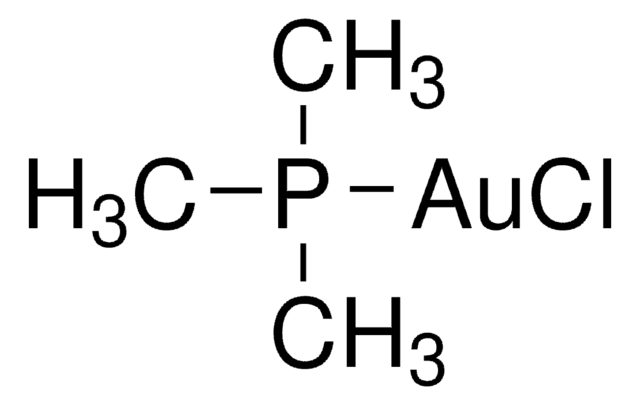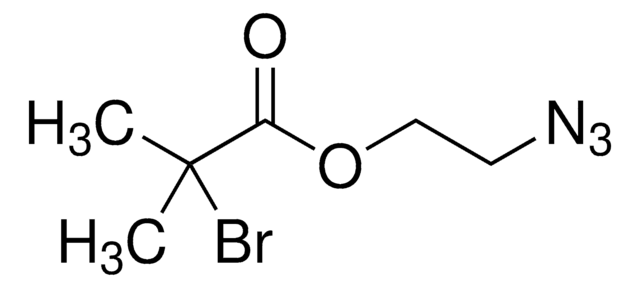252271
α-Bromoisobutyryl bromide
98%
Sinónimos:
2-Bromo-2-methylpropionyl bromide, BIBB
About This Item
Productos recomendados
assay
98%
form
liquid
refractive index
n20/D 1.507 (lit.)
bp
162-164 °C (lit.)
density
1.86 g/mL at 25 °C (lit.)
SMILES string
CC(C)(Br)C(Br)=O
InChI
1S/C4H6Br2O/c1-4(2,6)3(5)7/h1-2H3
InChI key
YOCIJWAHRAJQFT-UHFFFAOYSA-N
¿Está buscando productos similares? Visita Guía de comparación de productos
Categorías relacionadas
General description
Application
- as atom transfer radical polymerization (ATRP) initiator for functionalization of hydroxyl groups present on the surface of graphene oxide
- to form an N-protected halodienamide which provided four- and five-membered lactams in the presence of copper (I) and a tertiary amine
- in preparation of polycaprolactone macroinitiator via reaction with oligomeric caprolactone diol and mesoporous silica nanoparticles with ATRP initiator anchored on the exterior surface
signalword
Danger
hcodes
Hazard Classifications
Eye Dam. 1 - Skin Corr. 1B
Storage Class
8A - Combustible corrosive hazardous materials
wgk_germany
WGK 3
flash_point_f
>230.0 °F
flash_point_c
> 110 °C
ppe
Faceshields, Gloves, Goggles, type ABEK (EN14387) respirator filter
Certificados de análisis (COA)
Busque Certificados de análisis (COA) introduciendo el número de lote del producto. Los números de lote se encuentran en la etiqueta del producto después de las palabras «Lot» o «Batch»
¿Ya tiene este producto?
Encuentre la documentación para los productos que ha comprado recientemente en la Biblioteca de documentos.
Los clientes también vieron
Protocolos
ARGET ATRP procedure facilitates PMMA polymer brush growth with surface cleaning and initiator monolayer deposition.
Polymerization via ATRP procedures demonstrated by Prof. Dave Haddleton's research group at the University of Warwick.
Nuestro equipo de científicos tiene experiencia en todas las áreas de investigación: Ciencias de la vida, Ciencia de los materiales, Síntesis química, Cromatografía, Analítica y muchas otras.
Póngase en contacto con el Servicio técnico








![Tris[2-(dimethylamino)ethyl]amine 97%](/deepweb/assets/sigmaaldrich/product/structures/695/792/ee0ff167-22a3-43a7-83a1-6c4908adf0ae/640/ee0ff167-22a3-43a7-83a1-6c4908adf0ae.png)

![Bis[2-(2-bromoisobutyryloxy)undecyl] disulfide 97%](/deepweb/assets/sigmaaldrich/product/structures/340/293/c46f0349-d50c-48d8-899f-e42b09fae485/640/c46f0349-d50c-48d8-899f-e42b09fae485.png)